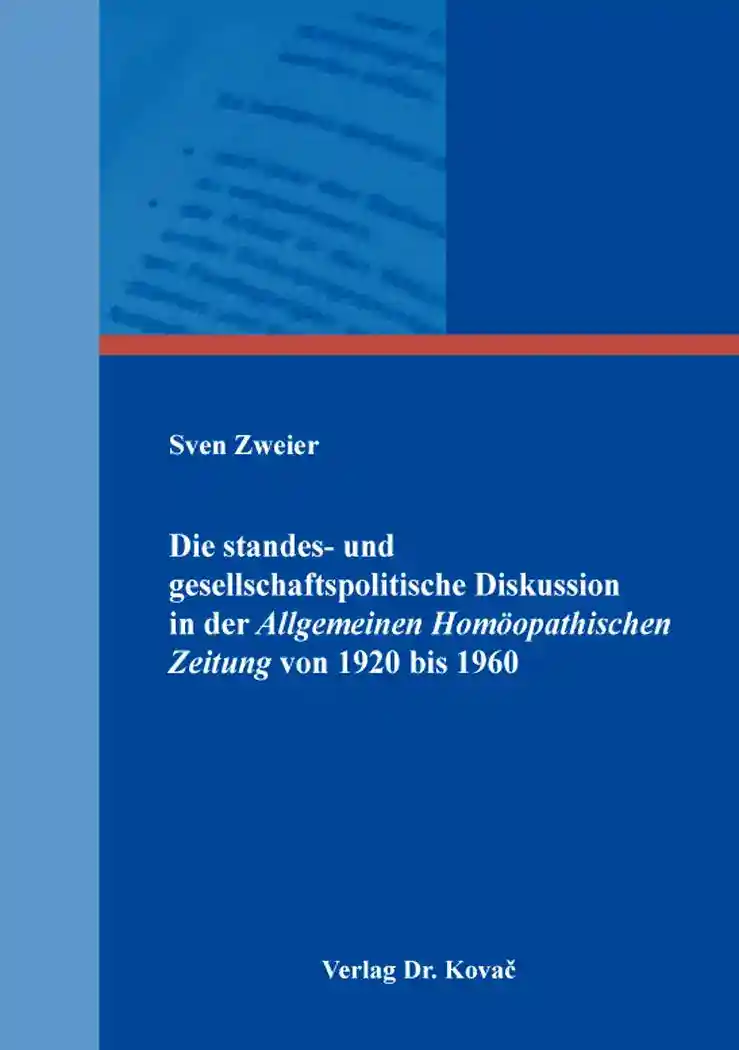Sven ZweierDie standes- und gesellschaftspolitische Diskussion in der Allgemeinen Homöopathischen Zeitung von 1920 bis 1960
Schriften zur Medizingeschichte, volume 8
Hamburg 2018, 314 pages
ISBN 978-3-339-10224-9 (print) |ISBN 978-3-339-10225-6 (eBook)
About this book deutschenglish
The Allgemeine Homöopathische Zeitung (AHZ), or General Homoeopathic Gazette, has been released since 1832 and has been serving occasionally as a publication organ of the German Central Association of Homoeopathic Physicians. The association was founded in 1829 to celebrate the 50th anniversary of Samuel Hahnemann’s doctorate. The AHZ is thus the oldest edited medical journal in Germany. In its beginnings, the journal was an expression of the emerging homoeopathy of the early 19th century and an answer to the demand for a means of intellectual exchange about experience. It served as a platform for all matters conducive to the teaching of homoeopathy and the scholarly community of homoeopaths. Its purpose was to present medical case histories as well as drug test results, but also to outline homoeopathy’s position in society; to illuminate its relationship with state authorities and allopathic physicians; and to expose orders aimed at suppressing homoeopathy to the public. With the appearance of the AHZ, a political voice was given to the homoeopathic community, and this voice was not only intended to serve the development of homoeopathic teaching and science, but also the professional community’s need for representation. The present study outlines the professional and sociopolitical discussions of the years 1920 to 1960, a time period characterized by social upheaval, as they were reflected in the AHZ. In doing so, the dissertation contributes to the leading question of the DFG project ”Politik in deutschen und britischen Fachjournalen von der Zwischenkriegszeit bis in die 1950er Jahre” (“Politics in German and British trade journals from the interwar period until the 1950s”), which is housed in the Institute for History, Ethics and Philosophy of Medicine of the Medical University of Hanover and is led by Sigrid Stöckel and Brigitte Lohff. The dissertation took all contributions to professional and social policy discussions in this journal during the said time period into account. The analyses were based on index research and on digitized versions of all contributions in the volumes from 1920 to 1948. In addition, a DVD edited by the publishing house Haug Verlag with the title AHZ Erfahrungsschatz Homöopathie – Jahrgänge 1948–2002 (AHZ Wealth of experience of Homoeopathy – years 1948-2002) was used to access articles. The main thematic focuses were analyzed quantitatively, i.e. by measuring frequency, and qualitatively, i.e. by considering the content in each of the three historic periods of the Weimar Republic, of National Socialism and of the post-war period. In summary, the analyses show that the journal had two main focuses: the one was subject specific and included topics relevant to advanced training, the other focus was on professional politics, which were primarily concerned with homoeopathy’s relationship to academic medicine, the relation of the different homoeopathic currents to each other, and the relation of German to international homoeopathy. The journal tried to establish Hahnemann’s work and circle as the main drivers of the development of homoeopathy and, thereby, attempted to give homoeopathy and the homoeopathic community a specific identity. In particular, the AHZ served as a platform for the opinion of scientifically-oriented homoeopaths in order to bridge the gulf between this discipline and academic medicine. In sum, opinions on national and world politics were held back. An exception were the efforts to legitimise homoeopathy as a part of the so-called Neue Deutsche Heilkunde (New German Healing Arts) in National Socialism. The efforts were supported by the editors out of self-interest and to support the repeated demands for the recognition of homoeopathy by academic medicine.
Keywords
Allgemeine Homöopathische ZeitungFachzeitschriftGesellschaftspolitische DiskussionHaug VerlagHomöopathieMedizingeschichteNationalsozialismusPolitik in der HomöopathieStandespolitikIhr Werk im Verlag Dr. Kovač

Möchten Sie Ihre wissenschaftliche Arbeit publizieren? Erfahren Sie mehr über unsere günstigen Konditionen und unseren Service für Autorinnen und Autoren.
